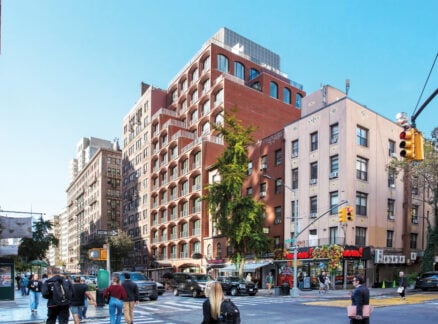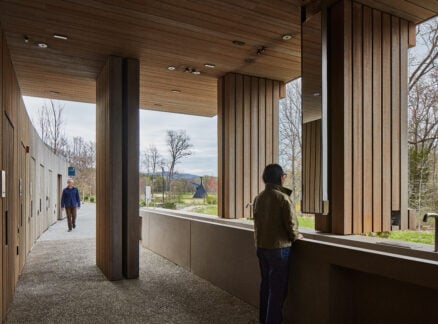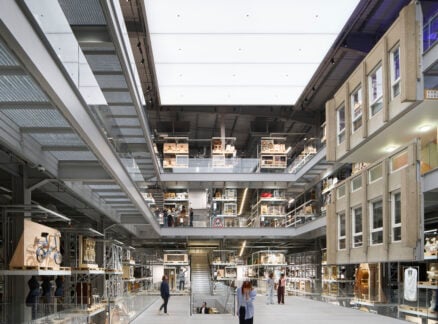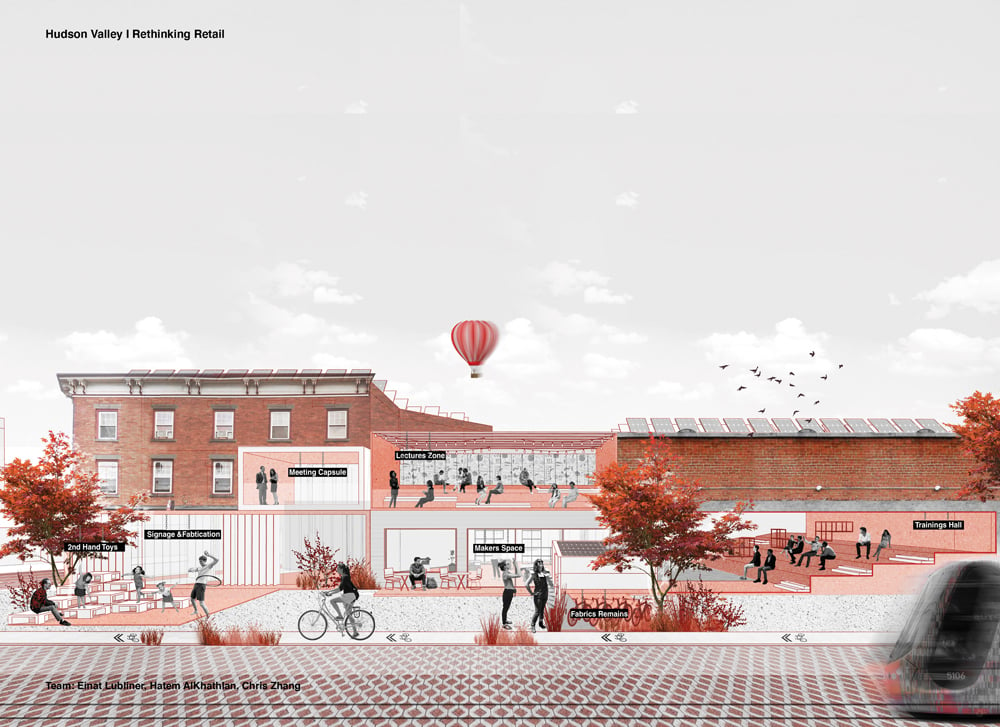
April 26, 2021
Future100: The Next Wave of Urban Planners Will Prioritize Social Capital
Four students try their hands at district planning and manage to imbue public spaces with a sense of democracy, productivity, and history.

What might the future of cities look like? If four recent and soon-to-be graduates have anything to say about it, it could include tele-tower structures that consolidate and deliver amenities throughout communities; universities that share a campus with a mall, an archive, and a cinema; an inside-out New York Public Library that turns Bryant Park into a “pneumatic book distribution center”; and cybersecurity in the form of an architectural Ctrl + Alt + Topia tower in Lower Manhattan. All of these inform visions of autonomous cities and communities.
The cohort apply a speculative futures lens to imagine cities as a series of micro-scale, self-sustaining, and circular economies. By knitting together historical research, data analysis, and design, they are attempting to address what they see as problematic urban planning of the past—where insensitive development, an overemphasis on capital, and an ignorance of ecology and community have “failed to address the social, cultural, economic, and environmental challenges of our cities,” says Sushmita Shekar. As Matthew Morgan explains in his work, “I’m trying to create conditions for direct democracy and communities having voice and control over their environment. There’s an opportunity for architecture to become regenerative and undo environmental problems.”
For Shekar and Sophia Cabral, planners must place social capital and community infrastructure at the heart of urban intervention. In her tele-tower proposal, Cabral distributes a set of cone-shaped towers that serve as physical markers of community amenities in Overtown, one of Miami’s most culturally storied neighborhoods. The towers are meant to amplify the district’s existing social fabric with Wi-Fi zones, workshop centers, public art, hydroponic urban farming, vertical agricultural gardens, a community archive and museum, and outdoor workstations.
“What are we going to do now in the aftermath of the pandemic to get people to go outside again? These tele-towers don’t represent essential services like groceries. Rather, they are places you choose to go—for enjoyment, for community, for recreation,” Cabral says.
Shekar’s redefinition of the retail landscape in New York’s Hudson Valley moves away from what she views as declining retail models like big-box outlets and malls. Instead, she rethinks local systems of manufacturing, distribution, and retail—places where you can find different functions layered and collocated along a single Main Street.
As Shekar puts it, “The future of practice is to use design as a tool to engage in a dialogue with communities, stakeholders, and context.”
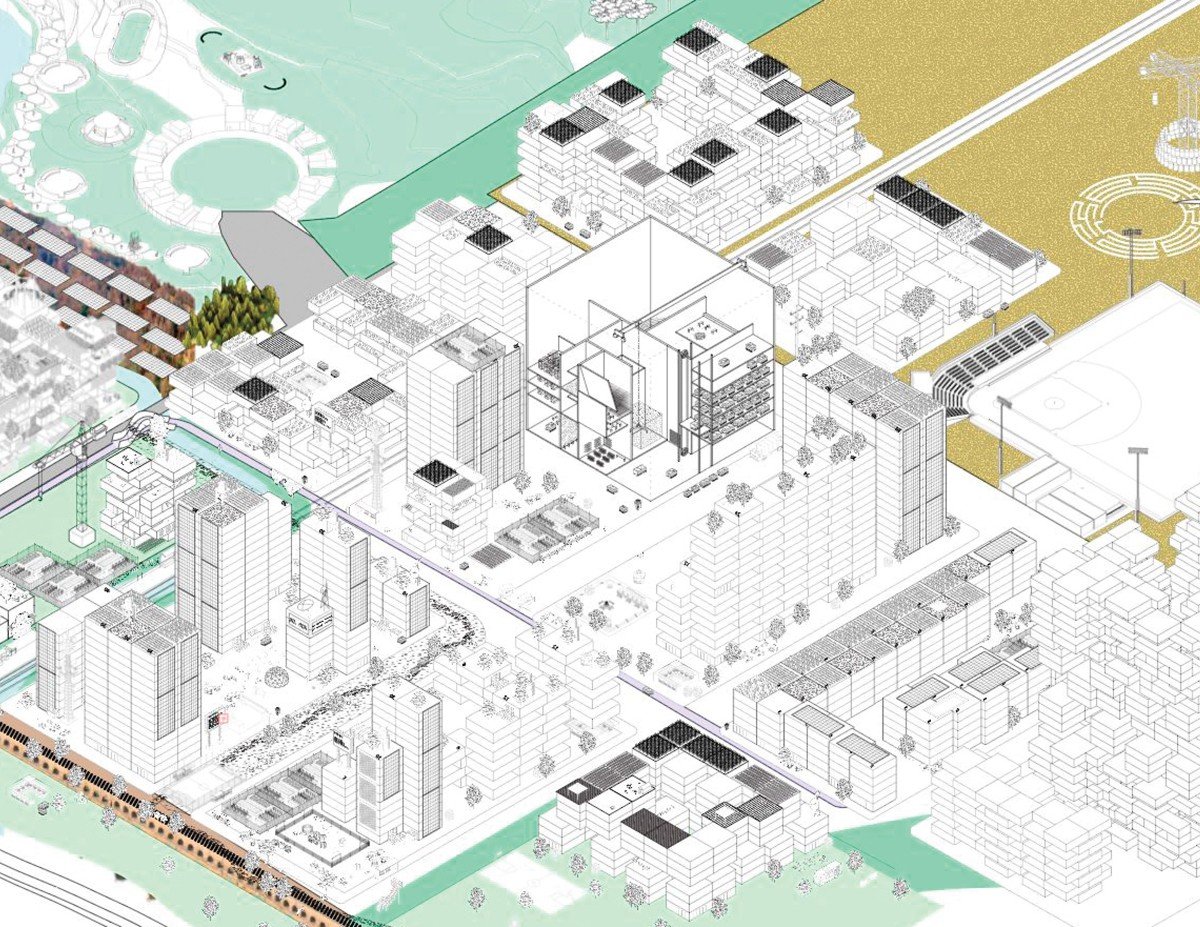
Visit metropolismag.com/future100 to see more groundbreaking student work.
SOPHIA CABRAL
Florida International University
Graduate Architecture
NOMINATOR: Shahin Vassigh, Professor, Program Director of Technology Research Development, Director of Robotics and Digital Fabrication Lab
Cabral begins many of her projects by investigating a site’s historical and cultural context. For Overtown, Miami, she creates tele-tower structures that catalyze activity and dialogue.
MATTHEW MORGAN
The City College of New York
Graduate Architecture
NOMINATOR: Shawn Rickenbacker, Associate Professor, Director of J. Max Bond Center for Urban Futures
An attention to the built forms of abstract assets such as knowledge and security pervades Morgan’s work. A tectonic or metabolic approach is evident in projects such as the Autonomous City waste cycle and a reimagining of the New York Public Library’s distribution system.
DAN ROTHBART
Rensselaer Polytechnic Institute
Undergraduate Architecture
NOMINATOR: Michael Oatman, Associate Professor of Architecture
Rothbart’s portfolio reflects an interest in institutional and infrastructural design, explored through models and material studies. A design for Troy, New York, conceives a single communal space that combines transportation, coworking, and leisure functions.
SUSHMITA SHEKAR
Columbia University
Graduate Architecture and Urban Design
NOMINATOR: Geeta Mehta, President of Asia Initiatives New York, Founding Partner of Urbz: User Generated Cities
With a research-driven approach, Shekar focuses on activating public space and enhancing livability and accessibility as a means of revitalizing areas from upstate New York to Scheveningen, the Netherlands.
You may also enjoy “Future100: Soundscapes Combat the ‘Tyranny of the Visual’”
Would you like to comment on this article? Send your thoughts to: [email protected]
Register here for Metropolis’s Think Tank Thursdays and hear what leading firms across North America are thinking and working on today.



